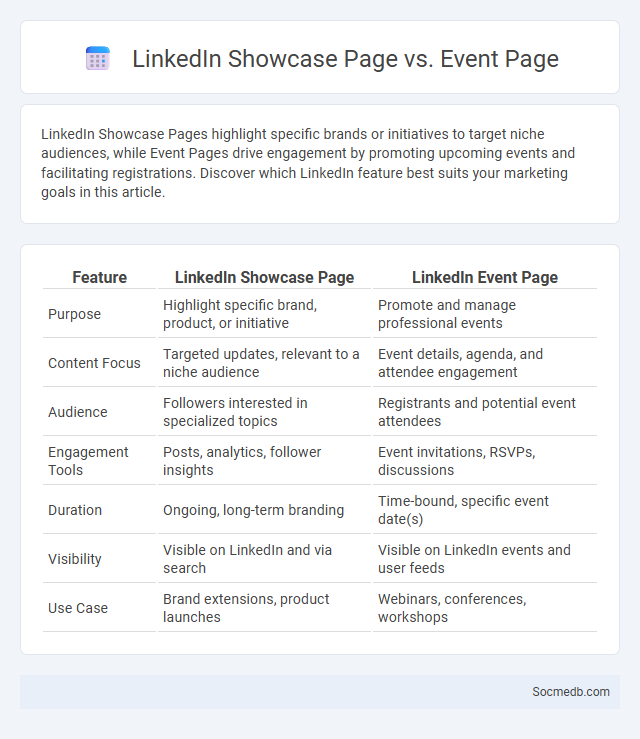
Photo illustration: LinkedIn Showcase Page vs Event Page
LinkedIn Showcase Pages highlight specific brands or initiatives to target niche audiences, while Event Pages drive engagement by promoting upcoming events and facilitating registrations. Discover which LinkedIn feature best suits your marketing goals in this article.
Table of Comparison
| Feature | LinkedIn Showcase Page | LinkedIn Event Page |
|---|---|---|
| Purpose | Highlight specific brand, product, or initiative | Promote and manage professional events |
| Content Focus | Targeted updates, relevant to a niche audience | Event details, agenda, and attendee engagement |
| Audience | Followers interested in specialized topics | Registrants and potential event attendees |
| Engagement Tools | Posts, analytics, follower insights | Event invitations, RSVPs, discussions |
| Duration | Ongoing, long-term branding | Time-bound, specific event date(s) |
| Visibility | Visible on LinkedIn and via search | Visible on LinkedIn events and user feeds |
| Use Case | Brand extensions, product launches | Webinars, conferences, workshops |
Understanding LinkedIn Showcase Pages: Purpose and Features
LinkedIn Showcase Pages enable businesses to highlight specific products, services, or initiatives, targeting niche audiences with tailored content. These pages offer features like custom branding, analytics, and the ability to share updates separately from the main company profile. By leveraging Showcase Pages, companies enhance audience engagement and improve brand positioning within LinkedIn's professional network.
What Is a LinkedIn Event Page? Key Functionalities
A LinkedIn Event Page is a dedicated platform feature designed to create, promote, and manage professional events within the LinkedIn network. It enables organizers to share event details, engage with invitees through discussions, and track RSVPs efficiently. Key functionalities include integration with LinkedIn profiles, targeted invitations based on professional interests, and analytics on attendee engagement and demographics.
Showcase Page vs Event Page: Core Differences
Showcase Pages highlight specific brands, products, or services, enabling you to target niche audiences with tailored content, while Event Pages focus on promoting and managing events with features like RSVPs and event updates. Showcase Pages offer continuous engagement opportunities by regularly sharing updates relevant to a segment, whereas Event Pages are time-bound, centering on driving attendance and interaction around a particular date. Choosing between the two depends on whether your goal is ongoing brand promotion or focused event marketing.
Benefits of Using LinkedIn Showcase Pages
LinkedIn Showcase Pages enhance brand visibility and engagement by targeting specific audience segments with tailored content. These pages allow businesses to highlight distinct products or services, improving lead generation and customer interaction. Leveraging Showcase Pages boosts organic reach and provides valuable insights through detailed analytics on audience behavior.
Advantages of Hosting LinkedIn Event Pages
Hosting LinkedIn Event Pages enhances professional networking by enabling direct engagement with industry-specific audiences, leading to higher quality connections. These event pages increase visibility through targeted promotion and algorithmic boosts, ensuring content reaches relevant professionals and decision-makers. Furthermore, LinkedIn's analytics tools provide detailed insights into attendee demographics and interaction patterns, optimizing future event planning and marketing strategies.
Use Cases: When to Choose a Showcase Page
Choose a LinkedIn Showcase Page when You want to highlight a specific product, service, or initiative separate from Your main brand, enabling targeted content delivery to distinct audience segments. This tool is ideal for promoting niche offerings, engaging dedicated communities, or launching campaigns requiring focused messaging and branding. Showcase Pages improve visibility by tailoring updates, increasing relevance and engagement with potential customers interested in particular aspects of Your business.
Use Cases: When to Leverage Event Pages
Event pages on social media are essential for promoting webinars, product launches, and community gatherings, providing a centralized platform for information and engagement. They boost visibility through targeted invitations, reminders, and real-time updates, increasing attendee participation and interaction. Brands leverage event pages to gather insights on audience demographics and behavior, optimizing marketing strategies for future events.
Content Strategy for Showcase Pages
Showcase Pages on social media platforms allow you to target niche audiences by highlighting specific products or services with tailored content strategies. Effective content for your Showcase Pages includes high-quality visuals, engaging multimedia, and consistent updates that align with your brand messaging to boost audience engagement and conversion rates. Leveraging analytics tools helps refine your content strategy, ensuring your posts resonate with your audience's interests and drive business growth.
Promotional Tactics for Event Pages
Promotional tactics for event pages on social media include targeted advertising campaigns utilizing demographic and interest-based filters to reach the ideal audience efficiently. Engaging multimedia content such as videos, countdown timers, and interactive polls boosts visibility and encourages shares, increasing organic reach. Collaborations with influencers and strategic hashtag use amplify event awareness, driving higher registration and attendance rates.
Choosing the Right LinkedIn Page Type for Your Business Goals
Choosing the right LinkedIn page type for your business goals is crucial for maximizing your online presence and engagement. Whether you opt for a LinkedIn Company Page, Showcase Page, or LinkedIn Group depends on factors like target audience, brand objectives, and content strategy. You can optimize your marketing efforts and build stronger professional connections by selecting the page type that best aligns with your business vision and growth plans.
 socmedb.com
socmedb.com